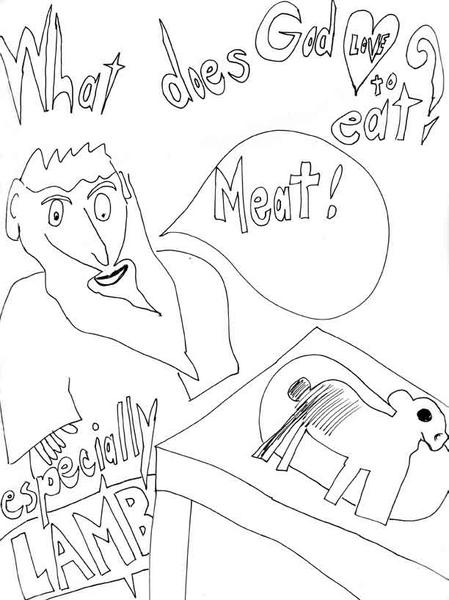A Few Things
One of the benefits of cleaning out the junk/book room is that I have been finding stacks of articles, magazines, newspapers, pictures, posters, maps, notes, etc. (often from way back before the advent of the Blogosphere) about things that caught my interest. Depending on whether or not they have kept their interestingness/coolness/quirkiness factor between the time I originally put them aside and now, I may be posting some of them here (or at least related stuff that I find on the Web).
For example, the Chicago Tribune ran a (now long-ago-archived) story a couple of years ago about a guy named Patrick Hambrecht who came up with an ambitious project: To have his alt-artsy friends (and their friends, and their friends, etc.) illustrate every single verse of the Bible. They currently have 2,595 complete, with 34,070 remaining, and the 2,595 are fascinating to browse through. (And before any of you smartasses run for the comments section, I'm not talking about this.) This is the kind of lifelong obsession that, if successful, the Simon Winchesters of the 22nd Century are going to write about.
In other news, here's a great Boing Boing-linked article by David Weinberger titled Why the Media Can't Get Wikipeida Right. Excerpt: With Wikipedia, the balance of knowing shifts from the individual to the social process. The solution to a failure of knowledge (as the Seigenthaler entry clearly was) is to fix the social process, while acknowledging that it will never work perfectly. There are still individuals involved, of course, but Wikipedia reputations are made and advanced by being consistent and persistent contributors to the social process. Yes, persistent violators of the social trust can be banished from Wikipedia, but the threat of banishment is not what keeps good contributors contributing well.
Also, Reason editor Nick Gillespie visits the Modern Language Association's annual convention on behalf of Tech Central Station and shares his impressions with us here, here, here, and here. (Those are in order, and no I haven't read all of them yet.) Excerpt from the fourth: Still, it's clear that in an information- and media-drenched world such as ours, critical reading and writing skills are at more of a premium than ever before. On this point, [University of Rhode Island Assoc. Prof. of French Alain-Philippe] Durand cited Roland Barthes who once said, with characteristic overstatement, that if the university could teach only one subject it should be literature -- because literature includes all other disciplines. What is blogging if not literary criticism gone wild?
For example, the Chicago Tribune ran a (now long-ago-archived) story a couple of years ago about a guy named Patrick Hambrecht who came up with an ambitious project: To have his alt-artsy friends (and their friends, and their friends, etc.) illustrate every single verse of the Bible. They currently have 2,595 complete, with 34,070 remaining, and the 2,595 are fascinating to browse through. (And before any of you smartasses run for the comments section, I'm not talking about this.) This is the kind of lifelong obsession that, if successful, the Simon Winchesters of the 22nd Century are going to write about.

Genesis 4:4
And Abel, he also brought of the firstlings of his flock and of the fat thereof. And the LORD had respect unto Abel and to his offering...
And Abel, he also brought of the firstlings of his flock and of the fat thereof. And the LORD had respect unto Abel and to his offering...
In other news, here's a great Boing Boing-linked article by David Weinberger titled Why the Media Can't Get Wikipeida Right. Excerpt: With Wikipedia, the balance of knowing shifts from the individual to the social process. The solution to a failure of knowledge (as the Seigenthaler entry clearly was) is to fix the social process, while acknowledging that it will never work perfectly. There are still individuals involved, of course, but Wikipedia reputations are made and advanced by being consistent and persistent contributors to the social process. Yes, persistent violators of the social trust can be banished from Wikipedia, but the threat of banishment is not what keeps good contributors contributing well.
Also, Reason editor Nick Gillespie visits the Modern Language Association's annual convention on behalf of Tech Central Station and shares his impressions with us here, here, here, and here. (Those are in order, and no I haven't read all of them yet.) Excerpt from the fourth: Still, it's clear that in an information- and media-drenched world such as ours, critical reading and writing skills are at more of a premium than ever before. On this point, [University of Rhode Island Assoc. Prof. of French Alain-Philippe] Durand cited Roland Barthes who once said, with characteristic overstatement, that if the university could teach only one subject it should be literature -- because literature includes all other disciplines. What is blogging if not literary criticism gone wild?










0 Comments:
Post a Comment
<< Home